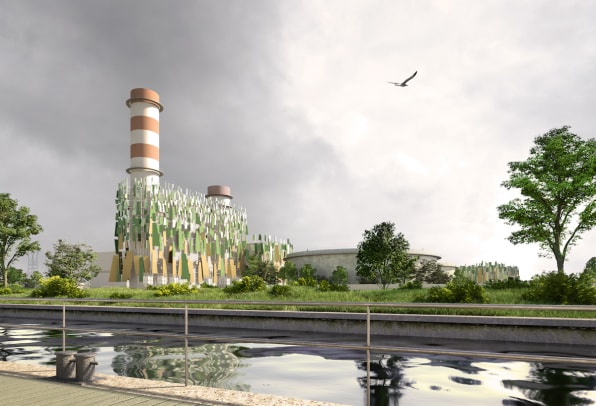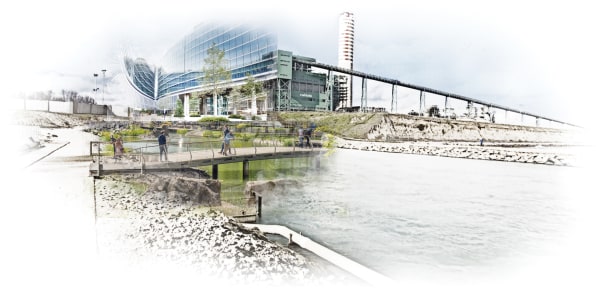Across Europe, energy giant Enel is converting its old polluting infrastructure into new centers for clean power.
08-04-21
[Image: courtesy Frigerio Design]
Enel, headquartered in Rome and Europe’s largest utility company, used to depend heavily on coal. But it’s in the process of shutting down all of its coal power plants globally over the next six years and transforming the old sites for new uses, including as renewable energy hubs.

[Image: courtesy Frigerio Design]“The main goal is to create genuine energy centers that are increasingly integrated with their local environment, reducing the impact on the landscape, thanks to a new idea of what a power plant can be,” Fabio Cautadella, head of power plant repurposing at the Enel Group, said via email. “Most of the coal-fired plants are being converted to renewable energy, but in some cases, they are enjoying a new lease on life with completely different roles. These projects are being developed in collaboration with the local communities, and in some specific cases with other partners, with a view to creating jobs and improving the quality of life in the area.”
In Teruel, Spain, for example, a massive former coal plant will be converted into Europe’s largest solar power plant, with extra wind power and battery storage on site that will more than replace the power generation from coal. Other sites will transition to green hydrogen, “a highly promising solution that can serve as an alternative to electricity in the so-called “hard to abate” sectors, such as heavy industry, shipping, and aviation,” Cautadella says. “In these cases, hydrogen can be extracted through processes powered by renewable sources, a unique technology that is genuinely green.”
In Italy, the company ran a “new energy spaces” competition for architects to redesign four former coal plants that run, in part, on renewable energy. A winning design in Venice turns part of the complex into a center focused on sustainable innovation open to the public. New buildings on the site, made with recycled materials, are designed to use as little energy as possible, and new plantings will help reconnect the industrial complex with the surrounding lagoon.

In Teruel, Spain, for example, a massive former coal plant will be converted into Europe’s largest solar power plant, with extra wind power and battery storage on site that will more than replace the power generation from coal. Other sites will transition to green hydrogen, “a highly promising solution that can serve as an alternative to electricity in the so-called “hard to abate” sectors, such as heavy industry, shipping, and aviation,” Cautadella says. “In these cases, hydrogen can be extracted through processes powered by renewable sources, a unique technology that is genuinely green.”
In Italy, the company ran a “new energy spaces” competition for architects to redesign four former coal plants that run, in part, on renewable energy. A winning design in Venice turns part of the complex into a center focused on sustainable innovation open to the public. New buildings on the site, made with recycled materials, are designed to use as little energy as possible, and new plantings will help reconnect the industrial complex with the surrounding lagoon.

[Image: Enel]
The projects aren’t all moving toward sustainability as quickly as is technically possible—some of the sites will use renewable energy in combination with gas, which still adds to climate change. Enel doesn’t plan to fully decarbonize until 2050, and arguably could reach that goal much faster. Still, the company was early to embrace renewable energy, launching Enel Green Power in 2008, now a global leader with more than 1,200 renewable power plants on five continents. And over the next decade, it’s planning to spend $190 billion to nearly triple its renewable capacity and build out the grid for a future with electric cars and other surging demands for electricity. Its investments in renewables over the next few years are nearly as much as the combined plans of BP, Total, and Shell. Finding new uses for old coal plants is one part of the larger transition.
“This repurposing is in line with the principles of the circular economy: This way, not only will they offer a new value to the areas in which these facilities are located, but they will also enable the reuse, at least in part, of the materials and some parts of the plants in order to minimize consumption of raw materials,” says Cautadella.
The projects aren’t all moving toward sustainability as quickly as is technically possible—some of the sites will use renewable energy in combination with gas, which still adds to climate change. Enel doesn’t plan to fully decarbonize until 2050, and arguably could reach that goal much faster. Still, the company was early to embrace renewable energy, launching Enel Green Power in 2008, now a global leader with more than 1,200 renewable power plants on five continents. And over the next decade, it’s planning to spend $190 billion to nearly triple its renewable capacity and build out the grid for a future with electric cars and other surging demands for electricity. Its investments in renewables over the next few years are nearly as much as the combined plans of BP, Total, and Shell. Finding new uses for old coal plants is one part of the larger transition.
“This repurposing is in line with the principles of the circular economy: This way, not only will they offer a new value to the areas in which these facilities are located, but they will also enable the reuse, at least in part, of the materials and some parts of the plants in order to minimize consumption of raw materials,” says Cautadella.

No comments:
Post a Comment